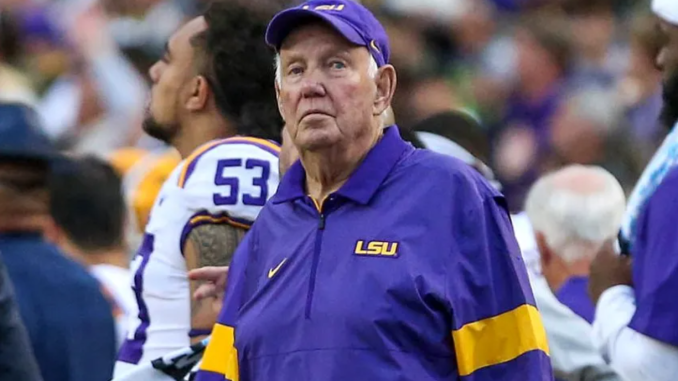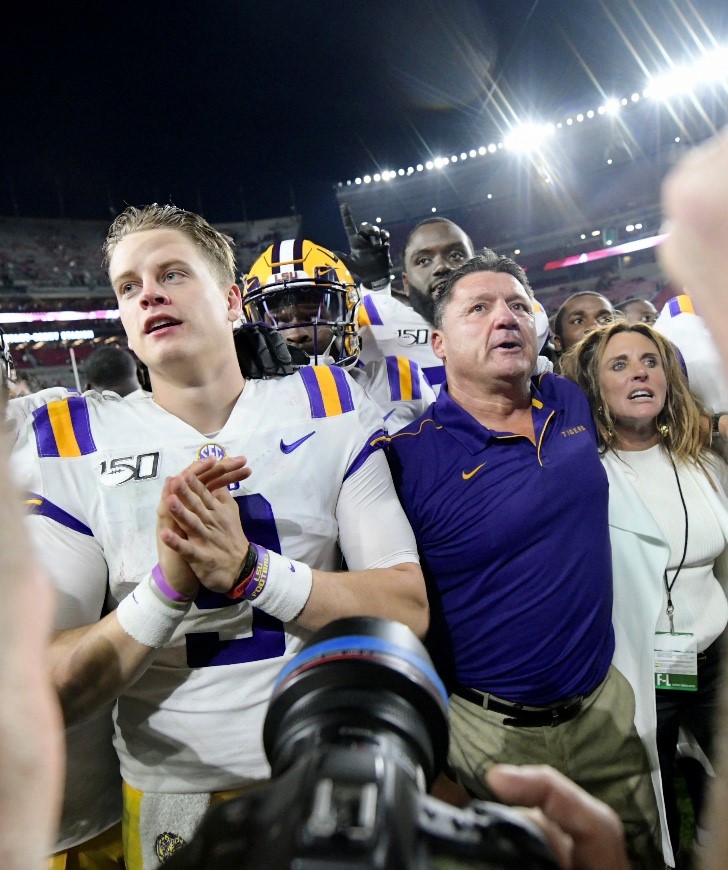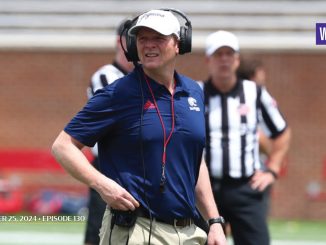
John Robinson, the cherished head coach who guided the University of Southern California’s football team to four Rose Bowl victories and one national championship, as well as leading the Los Angeles Rams close to two Super Bowls, passed away on Monday in Baton Rouge. He was 89 years old.
A legendary coach, Robinson’s last coaching role was at LSU, where he worked as a special assistant to Head Coach Ed Orgeron. During his time at the Ole War Skule, LSU celebrated a fantastic 2019 national championship, finishing with a perfect 15-0 record, and is remembered as one of the greatest college football teams ever.
JOHN ROBINSON SAID LSU SHOULD’VE BEAT USC IN 1979 CLASSIC AT TIGER STADIUM
Orgeron has not yet returned a call from Tiger Rag to comment on his and Robinson’s special relationship, one that is believed to have been formed when Orgeron was an assistant coach at USC from 1998 to 2004 and again from 2010-2013, as well when Orgeron was the interim head coach for the Trojans in 2013, replacing Lane Kiffin, who was infamously fired on the tarmac at LAX following a USC loss.
USC reported that Robinson’s passing resulted from complications due to pneumonia.
Throughout his impressive 27-year coaching career, Robinson was well-known as a players’ coach who was always humble and approachable. He led the USC Trojans, the Los Angeles Rams, and the University of Nevada, Las Vegas Rebels with a wonderful mix of humor and kindness. Jim Murray, a sports columnist for The Los Angeles Times, said Robinson was refreshing and different from the typical tough coaches.
Murray wrote in 1982, “Football coaches often have a hard edge, but Robinson was more like a friendly doctor helping people.”
Vince Newsome, a safety for the Rams, shared similar feelings, recalling how Robinson had a special way of inspiring players.
“He could lift anyone’s spirits, even when you didn’t know how he did it,” Newsome told The New York Times in 1988. “He could talk to players from his own experience and help them feel better.”
When Robinson first became the Trojans’ coach in 1976, he succeeded John McKay and won the Rose Bowl, a success he repeated after the 1978 and 1979 seasons. In 1978, USC was named the top team in the final United Press International coaches poll, finishing with a 12-1 record and sharing the national title with Alabama.
Robinson’s coaching also led to great honors for his players, with running backs Marcus Allen and Charles White winning the prestigious Heisman Trophy in 1979 and 1981, respectively.
Robinson’s career had its challenges too. He faced disciplinary actions from governing bodies twice. The Pac-10 conference banned USC from playing in a bowl game after the 1980 season due to NCAA violations, which included enrolling over 30 players in classes they did not attend. Robinson voiced his frustration, saying the penalties seemed too harsh and that the NCAA had shifted its approach.
At the end of the 1982 season, Robinson announced his resignation to take on a new role as USC’s senior vice president of university relations. However, he returned to coaching with the Rams just four months later.
When discussing his decision to coach again, Robinson shared how much he missed the thrill of the game. “When I coached, I jumped out of bed as soon as the alarm went off,” he told The Washington Post in 1983. “With the new job, I found myself lying there for a long time. I knew something was off.”
John Alexander Robinson was born on July 25, 1935, in Chicago to Matthew and Ethlyn (Alexander) Robinson. His family moved to Provo, Utah, when he was six and later to Daly City, California, where he met his lifelong friend, the future Oakland Raiders coaching great and announcer John Madden, at Our Lady of Perpetual Help School.
Robinson’s football journey began in high school, where he played both football and baseball in San Mateo, California. He later played as a seldom-used receiver at the University of Oregon, where he met his future mentor, John McKay. “I often visited his office to ask him to teach me about football,” Robinson told The Las Vegas Sun in 2004. “I thought he was the smartest person ever.”
Robinson graduated from Oregon with a degree in education in 1960 and started his coaching career as an assistant with the university’s football team. He stayed there until 1972, when McKay, now the head coach at USC, hired him as his offensive backfield coach. Robinson then moved on to Oakland under Madden, before taking over as head coach at USC.
Madden praised Robinson for his unique combination of intelligence and people skills.
“He had both intelligence and the ability to connect with people,” Madden told The Los Angeles Times, highlighting the qualities that made Robinson an exceptional coach.
John Robinson
Personal information
Born: July 25, 1935
Chicago, Illinois, U.S.
Died: November 11, 2024 (aged 89)
Baton Rouge, Louisiana, U.S.
Career information
High school: Junípero Serra
(San Mateo, California)
College: Oregon
Career history
As a coach:
Oregon (1960–1971)
Assistant coach
USC (1972–1974)
Offensive coordinator
Oakland Raiders (1975)
Running backs coach
USC (1976–1982)
Head coach
Los Angeles Rams (1983–1991)
Head coach
USC (1993–1997)
Head coach
UNLV (1999–2004)
Head coach
San Marcos HS (CA) (2010) Defensive coordinator
As an administrator:
UNLV (2002–2003)
Athletic director
LSU (2019–2021)
Senior consultant
Career highlights and awards
As head coach:
National champion (1978)
5× Pac-8/Pac-10 (1976, 1978–1979, 1993, 1995)
4× Rose Bowl champion (1976, 1978, 1979, 1995)
MW Coach of the Year (2000)
Rose Bowl Hall of Fame (2003)
As assistant coach:
3× National champion (1972, 1974, 2019)
2× Rose Bowl champion (1972, 1974)
Head coaching record
Regular season: 75–68 (.524) (NFL)
132–77–4 (.629) (college)
Postseason: 4–6 (.400)
Career: 79–74 (.516) (NFL)
140–78–4 (.640) (college)




Be the first to comment